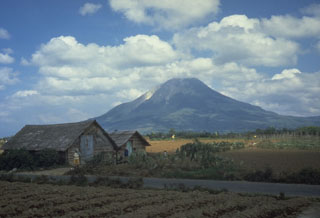Report on Sinabung (Indonesia) — 1 September-7 September 2010
Smithsonian Institution / US Geological Survey
Weekly Volcanic Activity Report, 1 September-7 September 2010
Managing Editor: Sally Sennert.
Please cite this report as:
Global Volcanism Program, 2010. Report on Sinabung (Indonesia) (Sennert, S, ed.). Weekly Volcanic Activity Report, 1 September-7 September 2010. Smithsonian Institution and US Geological Survey.
Sinabung
Indonesia
3.17°N, 98.392°E; summit elev. 2460 m
All times are local (unless otherwise noted)
According to news articles, about 6,000 of the approximately 30,000 people that evacuated the area around Sinabung after the eruption during 29-30 August returned home within a few days because activity had decreased. The Darwin VAAC reported a large explosion on 3 September, based on information from CVGHM. News reports stated that the explosion vibrated homes and trees on the flanks, and generated a 3-km-high ash plume. CVGHM reported that another large explosion on 7 September produced an ash plume that rose 5 km above the crater and drifted SE. Strong vibrations caused by the explosion were detected as far away as 8 km SE.
Geological Summary. Gunung Sinabung is a Pleistocene-to-Holocene stratovolcano with many lava flows on its flanks. The migration of summit vents along a N-S line gives the summit crater complex an elongated form. The youngest crater of this conical andesitic-to-dacitic edifice is at the southern end of the four overlapping summit craters. The youngest deposit is a SE-flank pyroclastic flow 14C dated by Hendrasto et al. (2012) at 740-880 CE. An unconfirmed eruption was noted in 1881, and solfataric activity was seen at the summit and upper flanks in 1912. No confirmed historical eruptions were recorded prior to explosive eruptions during August-September 2010 that produced ash plumes to 5 km above the summit.
Sources: Pusat Vulkanologi dan Mitigasi Bencana Geologi (PVMBG, also known as CVGHM), The Jakarta Post, CNN, Associated Press

